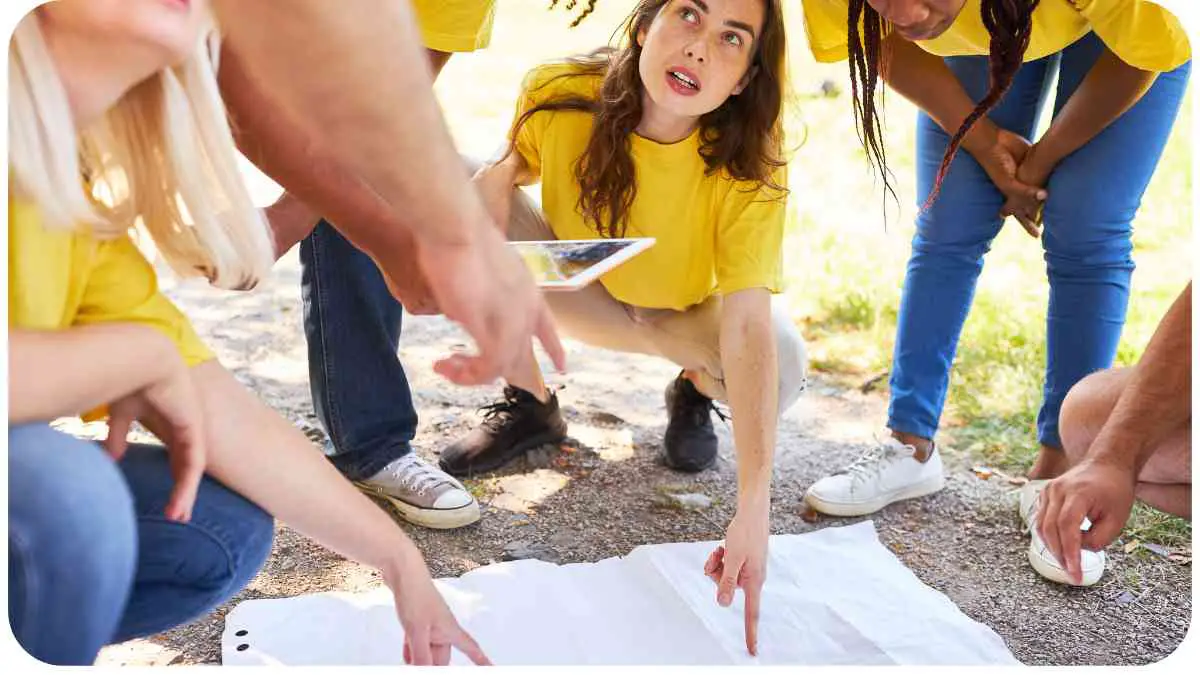Welcome to the exciting world of treasure hunting! Whether you’re an experienced enthusiast or just starting out, it’s important to prioritize safety during your expeditions. This article will provide you with valuable insights, tips, and precautions to ensure a safe and enjoyable treasure hunting experience.
| Takeaways |
|---|
| 1. Research and understand the laws and regulations surrounding treasure hunting in your area. Obtain necessary permits and permissions before starting your expedition. |
| 2. Prioritize safety by being aware of potential hazards above ground, such as steep cliffs and poisonous plants. Watch out for hidden underground hazards like pipes or electrical wires. |
| 3. Respect the environment and leave no trace. Dispose of waste properly and avoid disturbing sensitive ecosystems. |
| 4. Stay informed about weather conditions and be prepared for unexpected changes. Monitor forecasts and reschedule your expedition if severe weather is predicted. |
| 5. Carry essential safety equipment like a basic first aid kit and communication devices. Obtain proper training in first aid and CPR to handle emergencies effectively. |
| 6. Follow responsible digging techniques, use hand tools for excavation, and fill any holes you dig. |
| 7. Be aware of hazardous wildlife species in the area, learn about their behavior, and maintain a safe distance to avoid negative encounters. |
| 8. Respect cultural heritage and archaeological sites. Avoid damaging artifacts or structures and report any findings to the appropriate authorities. |
| 9. Stay updated with safety guidelines and further resources available through reputable websites and treasure hunting communities. |
| 10. Prioritize personal safety and well-being above finding treasures. Remember that treasures can always be found another day, but your safety is irreplaceable. |
Understanding the Basics
What is Treasure Hunting?
Treasure hunting involves searching for valuable artifacts, coins, jewelry, or other hidden treasures that have historical, cultural, or monetary value. It’s a thrilling hobby that combines exploration, history, and the joy of discovery. However, it’s essential to approach treasure hunting with caution and responsibility.
When embarking on a treasure hunt, it’s crucial to understand the legal landscape. Legal Guide provides insights into navigating the legal intricacies, ensuring an ethical and legal treasure hunting experience.
Types of Treasure Hunting

There are various types of treasure hunting, each with its unique challenges and safety considerations. Here are a few popular ones:
| Type of Treasure Hunting | Description |
| Metal Detecting | Using a metal detector to locate buried artifacts, coins, and treasures. |
| Underwater Scuba Diving | Exploring underwater sites, such as shipwrecks, in search of sunken treasures. |
| Geocaching | Using GPS coordinates to locate hidden containers or “caches” filled with small treasures. |
| Beachcombing | Searching beaches for lost items, including coins, jewelry, and other valuable objects. |
Essential Safety Precautions
To ensure your safety during treasure hunting escapades, it’s crucial to follow essential safety precautions.
Research and Planning
Before embarking on a treasure hunting adventure, thorough research and planning are key. Start by learning about the area you intend to explore, including its history, local regulations, and potential hazards. Identify any restrictions or permissions required for hunting in specific locations.
Uncover the secrets of successful metal detecting with the Beginner’s Guide. This comprehensive resource equips beginners with essential tips and tricks for maximizing their metal detecting skills and making exciting discoveries.
Proper Equipment
Equipping yourself with the right tools and equipment is vital for both safety and success. This includes a reliable metal detector, digging tools, a backpack, and proper storage containers for any artifacts you find. Researching and investing in quality equipment will enhance your treasure hunting experience.
Protective Gear
Wearing appropriate protective gear is crucial to minimize the risk of accidents and injuries. Consider the following items:
- Sturdy boots with ankle support to protect your feet during uneven terrain exploration.
- Durable gloves to shield your hands from sharp objects or potential hazards.
- Sunscreen and a wide-brimmed hat to protect yourself from the sun’s harmful rays.
Embark on your treasure hunting journey ethically with insights from Treasure Hunting Ethics. Learn the principles that guide responsible treasure hunting, ensuring preservation and respect for historical artifacts while enjoying the thrill of the hunt.
Buddy System
Never venture into the wilderness or explore unfamiliar areas alone. Pair up with a friend or join a local treasure hunting club to ensure you have someone to rely on in case of emergencies. The buddy system not only adds an extra layer of safety but also enhances the overall experience through shared memories and discoveries.
Emergency Contacts
Before heading out, inform a trusted friend or family member about your treasure hunting plans. Provide them with details of your location, estimated return time, and contact information. In case of any unexpected circumstances or emergencies, they will know how and where to seek help.
Location Matters
When it comes to treasure hunting, the location you choose can significantly impact your safety. Consider the following factors when deciding where to search for treasures.
Preserve the past responsibly with guidance from Handle Finds. This resource offers valuable tips on preserving artifacts and antiquities, ensuring your discoveries contribute to the rich tapestry of history for generations to come.
Public vs Private Lands
Different rules and regulations apply to treasure hunting on public and private lands. Public lands, such as state parks or beaches, may have designated areas where metal detecting is allowed. Ensure you are aware of any restrictions or permits required in these areas. When it comes to private lands, always seek permission from the landowner before beginning your search.
Permission and Permits
Always obtain the necessary permissions or permits before conducting treasure hunting activities. This is particularly important when exploring historical sites or protected areas. Contact local authorities or land management agencies to inquire about any special permissions required. Respecting the rules and regulations in place ensures the preservation of archaeological sites and cultural heritage.
Conservation and Environmental Considerations
As treasure hunters, we have a responsibility to minimize our impact on the environment. Avoid disturbing or damaging sensitive ecosystems, such as habitats or natural landmarks. Dispose of any waste properly and follow the principles of “leave no trace.” By practicing conservation-minded treasure hunting, we can protect both the environment and our own safety.
Enhance your treasure hunting skills by delving into history with the Researching Guide. This quick and easy guide provides insights into effective historical research, helping you uncover hidden gems and stories behind your finds.
Uncovering Hidden Dangers
While treasure hunting can be a thrilling and rewarding experience, it’s essential to be aware of potential hazards that may be encountered.
Hazards Above Ground
When exploring outdoor areas, be cautious of natural obstacles like fallen trees, steep cliffs, or unstable ground. Watch out for poisonous plants, such as poison ivy or poison oak. Be mindful of your surroundings and use common sense when navigating through unfamiliar terrain.
Hazards Underground
Hidden underground hazards pose a risk to treasure hunters, especially those using metal detectors. Be mindful of hidden pipes, electrical wires, or other underground infrastructure. Always dig responsibly and use hand tools to avoid damaging existing underground systems.
Hazardous Wildlife Encounters
In some treasure hunting locations, encounters with wildlife can be a possibility. Familiarize yourself with the wildlife species commonly found in the area you are exploring. Learn how to identify potentially dangerous animals and understand their behavior. Keep a safe distance and respect their habitat to prevent any negative interactions.
Weather and Natural Disasters
Weather conditions and natural disasters can significantly impact your safety during treasure hunting expeditions. Stay updated on weather forecasts and be prepared for unexpected changes.
Monitoring Weather Conditions
Before heading out, check the weather forecast for the day and location of your treasure hunt. Keep an eye out for severe weather alerts or conditions that could pose a risk, such as thunderstorms or extreme heat. If adverse weather is predicted, it’s wise to reschedule your expedition for another day.
Safety Measures during Natural Disasters
In the event of a natural disaster, such as an earthquake or hurricane, prioritize your safety and immediately seek shelter in designated areas. Follow local authorities’ instructions and stay informed through emergency communication channels. Remember, treasures can always be found another day, but your well-being should never be compromised.
Legal and Ethical Considerations

As responsible treasure hunters, it’s crucial to be aware of legal and ethical obligations. Respect the laws and regulations in place and follow ethical guidelines to preserve historical significance and protect cultural heritage.
Laws and Regulations
Familiarize yourself with the laws regarding treasure hunting in your area. Some locations may require permits or have specific regulations for archaeological sites. Ignoring or violating these laws can result in fines or legal consequences. Be knowledgeable and respect the rules.
Cultural Heritage and Archaeological Sites
Certain areas may hold significant cultural or archaeological importance. These sites should be treated with utmost respect and care. Avoid disturbing or damaging any artifacts or historical structures you come across. Instead, report your findings to the appropriate authorities, allowing professionals to study and preserve them properly.
Code of Conduct
Adopt a personal code of conduct that promotes responsible treasure hunting. This includes leaving artifacts and natural resources untouched, practicing proper excavation techniques, and sharing knowledge and experiences with the fellow treasure hunting community.
Safety Tips for Metal Detecting
Metal detecting is one of the most popular forms of treasure hunting, and following these safety tips can enhance your experience while keeping you safe.
Research Your Detector
Before purchasing a metal detector, do thorough research to find one suitable for your needs and budget. Look for models that offer features like discrimination, sensitivity adjustments, and waterproof capabilities, depending on your treasure hunting preferences.
Proper Equipment Maintenance
Regularly maintain your equipment to ensure its optimal performance and longevity. Clean your metal detector, replace batteries as needed, and keep all components in good working condition. Proper equipment maintenance not only improves your efficiency but also reduces the risk of malfunctions during your hunts.
Sweep Technique
Mastering the sweep technique is crucial for maximizing your chances of finding hidden treasures. Keep the coil of your metal detector parallel to the ground, and swing it from side to side in a slow and controlled motion. Overlapping your swings slightly will help you cover the entire area systematically. Listen carefully to the audio signals and adjust the sensitivity and discrimination settings accordingly.
Digging Responsibly
When your metal detector signals a potential target, it’s time to dig. Practice responsible digging techniques to minimize your impact on the environment and prevent unnecessary disturbances. Use a small hand tool, such as a trowel, to excavate the area carefully. Fill any holes you dig and leave the location in the same or better condition than you found it.
Staying Prepared and First Aid
Being prepared for any situation is crucial for your safety during treasure hunting expeditions. Consider the following tips to stay prepared and handle emergencies effectively.
Basic First Aid Kit
Carry a basic first aid kit containing essential items to handle minor injuries. Ensure your kit includes adhesive bandages, antiseptic wipes, tweezers, gauze pads, adhesive tape, and any personal medications you may require. Familiarize yourself with basic first aid procedures, such as treating cuts, sprains, or insect bites.
Safety Training and CPR Certification
Consider obtaining safety training and CPR certification to enhance your ability to handle emergencies. Courses like wilderness first aid or basic life support can provide valuable knowledge and skills to address more severe injuries or medical conditions that may arise during your treasure hunting adventures.
Emergency Communication Devices
Always carry a reliable means of communication to stay connected in case of an emergency. This can include a fully charged cellphone, a two-way radio, or a personal locator beacon (PLB). Ensure you have signal coverage in the area you plan to explore and familiarize yourself with the operation of your chosen communication device.
Conclusion
Treasure hunting is an exhilarating hobby that allows you to immerse yourself in history and discover hidden treasures. However, it’s essential to prioritize safety throughout your adventures. By following the safety precautions outlined in this article, conducting thorough research, acquiring proper equipment, and respecting laws and regulations, you can ensure a safe and enjoyable treasure hunting experience.
Remember to always be prepared, stay informed about weather conditions, and be mindful of your surroundings. Treasure hunting can be both exciting and rewarding as long as your safety and the preservation of cultural heritage remain top priorities.
Further Reading
Here are some additional resources you can explore to learn more about treasure hunting safety:
- The Incredible Hunt – Staying Safe When You’re Treasure Hunting: This website provides valuable information and tips to ensure your safety during treasure hunting adventures. Learn about essential safety precautions, equipment recommendations, and more.
- Epic Treasure Hunters – Treasure Hunting Safety: Explore this comprehensive guide on treasure hunting safety. Discover tips and advice on planning, equipment, protective gear, and legal considerations to enhance your safety while hunting for treasures.
- Quora – What Items are Required for Treasure Hunting?: Find answers to frequently asked questions about the essential items needed for treasure hunting. Gain insights from the treasure hunting community and learn about the tools and equipment that are commonly used in this exciting hobby.
FAQs
Here are answers to some commonly asked questions about treasure hunting safety:
Q: How do I ensure that I’m treasure hunting legally?
A: To ensure you are treasure hunting legally, research the laws and regulations in your area. Obtain necessary permits and permissions, respect private property rights, and obey any restrictions or guidelines regarding archaeological sites or protected areas.
Q: What should I do if I encounter hazardous wildlife during my treasure hunt?
A: If you encounter hazardous wildlife, maintain a safe distance and avoid provoking them. Familiarize yourself with local wildlife species and their behavior. In case of an encounter, stay calm, back away slowly, and do not turn your back on the animal.
Q: How can I stay safe during adverse weather conditions while treasure hunting?
A: Monitor weather forecasts before heading out, and reschedule your expedition if severe weather is predicted. Be prepared for changes in weather and bring appropriate gear like rain jackets or sun protection. Seek shelter immediately if unexpected weather conditions arise.
Q: What safety precautions should I take when using a metal detector?
A: When using a metal detector, be aware of your surroundings and any underground hazards, such as pipes or electrical wiring. Use hand tools for digging to avoid damaging existing infrastructure. Practice responsible digging techniques and always fill any holes you dig.
Q: What should I do in case of an emergency during a treasure hunting expedition?
A: In case of an emergency, prioritize your safety and the safety of others. Use your emergency communication device to call for help if needed. Follow any safety training you’ve received, administer first aid if possible, and wait for assistance from rescue professionals.

Hi there! My name is Hellen James, and I’m here to talk to you about treasure hunting. I’ve been a fan of treasure hunting ever since I was a kid, and if you’re a fan of treasure hunting or just like the idea of finding a long-lost fortune, then this blog is for you.

